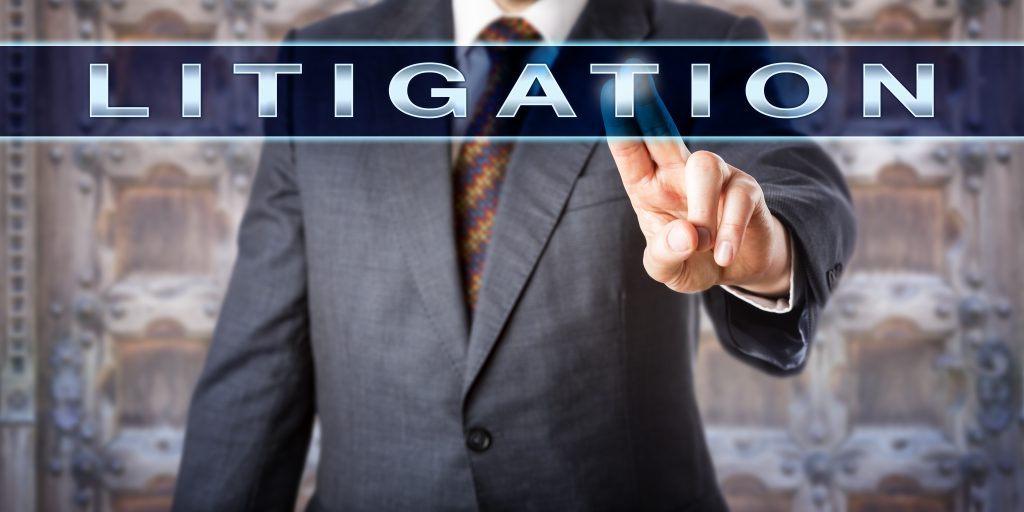What is Litigation?
Litigation is another word for a lawsuit, which is proceedings by a party or parties against another in the civil court of law. Litigation covers a large range of activities where dispute resolution is necessary through the court process.

Who can be taken to court?
A party to a lawsuit can be an individual, a business or an ‘entity’ such as a Government agency. Litigation may be against a company due to a dispute in a transaction or deal between the companies or between a company and an individual. These may be matters, such as contractual issues, fraud or regulatory competition for a business or divorce, personal injury, or employment disputes for an individual.
What if I can’t afford what I owe?
Litigation is not based on whether you can pay, it’s only concerned with whether you owe the sum to the other person. Even if you have no money, they can still decide that they have a case and that you still owe the money.
What to expect with Litigation
Litigation can be a long process, but it is there to allow individuals and companies to pursue their claim and gain justice in their circumstances. The process seems simple and follows a process, when a dispute arises, and if a reasonable settlement cannot be made a claim is issued stating the circumstances and what remedial action is required. The opponent is then given a chance to respond giving information as to why this settlement is not agreed.
A file is prepared and given to the courts by each party including any additional information such as financial reports, specialist examination reports and witness statements. Once all the paperwork is filed a judge will look at the claim and make a decision.
However, as with all legal claims there will be times where emotions run high and the task can feel frustrating and a lost cause, bearing this in mind we have put together some helpful hints in the event you have to deal with litigation.
- Don’t be afraid to ask questions
Litigation can be complex and confusing if you have never been through it before. If there is anything you are unsure about make sure you ask the question, with legal concerns there are no silly questions and gaining more insight may help you to feel more at ease during the process. Your solicitor is there to help and guide you through the process, so whatever you are worried about to do with the case make sure you discuss it.
2. Make sure you give them all the evidence
Evidence is power in legal cases and gives a higher chance of success. Make sure that anything you have regarding the case is given to your solicitors as early as possible so that they have everything in front of them when preparing your case. Your statement must be backed up with evidence to justify your position and your legal team will be able to work through your documents and decide what will help to strengthen your case.
3. Expect the unexpected
Litigation is a dispute, and your opponent will want to make it as difficult as they can for you to succeed. They will argue their case and may resist any chance of resolution to try and get the best outcome for themselves. This means at points you may disheartened and like it is a lost cause, but this is part of the process and by focussing on the outcome and understanding this you will know that you need to proceed to get justice.
4. Always be polite and calm in court
This may not be easy when the process is fuelled with emotion, but the court looks badly on those who come across rude, abusive or obstructive to the process. Litigation is a process to establish facts and who is to blame, answer all questions with clarity and conviction giving the answers to state your claim and show the injustice in your situation.
5. It is a process of balancing out the evidence
In many litigation cases there are two sides to the story and the judge has to look at both sides objectively and make a decision on fault. In many cases it is not 100% fault on one side, be prepared that the result may end in a split decision on fault and that although you didn’t win everything, you may have gained the majority of what you wished to achieve in the situation.
6. A judgement is not always the end
After a long battle you may have won or you may have lost, but either party can seek permission to appeal the judge’s decision. Although this may not happen it is always a good idea to be prepared for whatever may happen next.
7. Litigation is expensive
Solicitors will try to give you an estimate when the process starts based on their experience of how long it takes to gain settlement, this figure can be large. When looking at litigation it is always a good idea to evaluate whether it is the best course of action for you to take based on this estimate. Assessment of the risk and chances of success of your case is always needed at the outset and so a barristers’ opinion will always be needed. This will add to the expense at the outset but it is worth having so that you know where you stand and what your legal position is before you start court proceedings – this can also steer you in the right direction in respect of negotiations as you will know what you are likely to receive in court or what is the most reasonable outcome and middle ground to be able to settle which can save time and cost in the long run.
Always talk with your solicitor about payment options and understand the payment process they expect.

Here at ABS Solicitors, we have years of experience in Litigation and we provide a fully transparent process to help you understand what will be required in these circumstances. We are a friendly, supportive, and empathetic, we treat each client with the support and unique advice needed to find their way through the Litigation process.
Please note that all our legal costs and extras noted within our cost guides and quotes are exclusive of VAT, unless specifically indicated that VAT is not applicable.
VAT is charged at 20%
